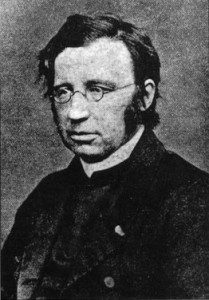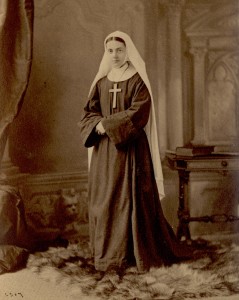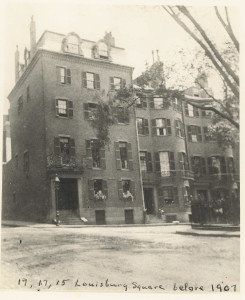The Society of Saint Margaret was founded as a nursing order in 1855 by the Reverend John Mason Neale to care for the poor and ill in the countryside in Sussex, England. They also taught and evangelized as there was opportunity. This work was so original and exciting that many were drawn to support and join the Sisterhood. As the demand for the help of the Sisters grew, daughter houses were established in Aberdeen (1864) and London (1866).
In 1873, the Sisters of St. Margaret came to Boston to act as superintendents at Children’s Hospital. Not limiting themselves to the work of nursing, the Sisters established a School of Embroidery, an Altar Bread Department and a Parochial School in connection with the Church of the Advent. From the very beginning the Sisters did a great deal of visiting among the sick and the poor, including serving the hungry from the soup kitchen at the Church of the Advent. In 1881, the first long term work outside of Boston was established in Montreal where the Sisters had been nursing in an epidemic of smallpox. In time, other works were developed: in Washington, DC; Philadelphia, PA; Newark, NJ; Bracebridge, Ontario; Lexington, KY, and Port-au-Prince, Haiti.
In 1883, the Sisters moved to Louisburg Square on Beacon Hill, Boston. This location was used as a Convent and a small private hospital. It also served as a place for others to come for retreat and spiritual guidance, and the Daily Office and Eucharist were celebrated in our chapel.
The Sisters were asked to consider going to Haiti and in March of 1926 two of the Sisters visited there. In 1927, Mother Susanna visited Haiti and promised that the Sisters would come to work the next autumn. Sisters moved into their new convent on December 1, 1928.
In 1928, the work began to grow in earnest and the Sisters took charge of ‘L’Ecole de la Cathedrale de la Sainte Trinite,’ (Holy Trinity School). In 1944, Sr. Joan went to Haiti. There were many in Haiti with physical disabilities for whom nothing was being done. It was to take special care of them that Sr. Joan opened what was first called La Crèche, a day nursery for the care of blind, deaf and crippled children under five years of age. Soon there were twenty children, and La Crèche had to move to larger quarters and take in older children as well. At that time they gave the work a new name, St. Vincent’s School for the Handicapped. The sisters also started a music program and in 1958, the budding orchestra gave its first concert. By 1973 the Holy Trinity Orchestra went on tour in the United States and played all over the country. In the early 1960’s, the United Thank Offering (UTO) gave a grant to build a home for elderly women in Port-au-Prince where six residents, life-long members of the Church could remain as long as was needed. It was close to the parish church of Notre Dame and so was known as the Foyer Notre Dame. It was dedicated on April 29, 1962.
When St. Monica’s Home, a nursing home run by the Sisters in Roxbury, closed in 1988, the community decided to move the Mother House from Beacon Hill to Roxbury. So the former St. Monica’s was adapted for its new use as the Sister’s center of operations and a new modern chapel was built. The community moved into the building in 1992.
The 2010 earthquake in Haiti destroyed the Convent and badly damaged the Foyer Notre Dame. This disastrous event drove home the need for the Sisters to reevaluate their mission work and ensure that enough resources and Sisters were available to respond the needs in Haiti and beyond. In August, 2012, the Sisters sold the Roxbury Convent to Emmanuel College, because the property had become too large and the resources needed to run it could be used elsewhere. They then relocated the center of operations to Duxbury, a property that the Society of St. Margaret purchased in 1903. A new, smaller, green Convent was built in Duxbury to provide housing for the Sisters and to be used as place to welcome guests and groups.
While Duxbury has become the Mother House, the Sisters continue to have a presence in Boston. Several Sisters live in a small residence in the city and maintain important urban ministries with St. Stephens Church in the south end and the Be Safe program. Additionally, there are mission houses in New York City (Manhattan), NY, and Port-au-Prince, Haiti.



